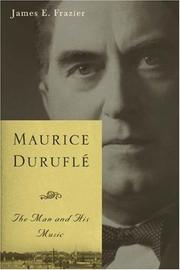| Listing 1 - 2 of 2 |
Sort by
|
Book
ISBN: 9780520275300 0520275306 9780520955271 0520955277 1299677401 Year: 2013 Publisher: Berkeley : University of California Press,
Abstract | Keywords | Export | Availability | Bookmark
 Loading...
Loading...Choose an application
- Reference Manager
- EndNote
- RefWorks (Direct export to RefWorks)
For the three forces competing for political authority in France during World War II, music became the site of a cultural battle that reflected the war itself. German occupying authorities promoted German music at the expense of French, while the Vichy administration pursued projects of national renewal through culture. Meanwhile, Resistance networks gradually formed to combat German propaganda while eyeing Vichy's efforts with suspicion. In The Musical Legacy of Wartime France, Leslie A. Sprout explores how each of these forces influenced the composition, performance, and reception of five well-known works: the secret Resistance songs of Francis Poulenc and those of Arthur Honegger; Olivier Messiaen's Quartet for the End of Time, composed in a German prisoner of war camp; Maurice Duruflé's Requiem, one of sixty-five pieces commissioned by Vichy between 1940 and 1944; and Igor Stravinsky's Danses concertantes, which was met at its 1945 Paris premiere with protests that prefigured the aesthetic debates of the early Cold War. Sprout examines not only how these pieces were created and disseminated during and just after the war, but also how and why we still associate these pieces with the stories we tell-in textbooks, program notes, liner notes, historical monographs, and biographies-about music, France, and World War II.
Music --- World War, 1939-1945 --- Music. --- Music and war. --- Musik. --- Weltkrieg. --- History and criticism. --- Music and the war. --- World War (1939-1945). --- 1900-1999. --- France. --- Frankreich. --- Music -- France -- 20th century -- History and criticism. --- Music -- Political aspects -- France -- History. --- Nationalism in music. --- World War, 1939-1945 -- Music and the war. --- Music, Dance, Drama & Film --- Music History & Criticism, General --- History and criticism --- Music and the war --- Songs and music --- aesthetic debates. --- arthur honegger. --- ballet. --- beaux arts. --- classical music. --- cultural battle. --- early cold war. --- engaging. --- entertainment industry. --- europe. --- france. --- francis poulenc. --- french history. --- german music. --- german propaganda. --- historical. --- history. --- international music. --- lively. --- maurice durufle. --- music. --- musical legacy. --- olivier messiaen. --- performing arts. --- political authority. --- prisoner of war camp. --- quartet for the end of time. --- requiem. --- resistance songs. --- retrospective. --- revolutionaries. --- secret resistance. --- vichy france. --- vichy. --- world war 2.

ISBN: 9781580469609 1580469604 9781580462273 1580462278 1283011220 9786613011220 1580467458 9781580467452 Year: 2007 Publisher: Woodbridge Boydell & Brewer
Abstract | Keywords | Export | Availability | Bookmark
 Loading...
Loading...Choose an application
- Reference Manager
- EndNote
- RefWorks (Direct export to RefWorks)
Maurice Durufl©♭: The Man and His Music is a new biography of the great French organist and composer (1902-86), and the most comprehensive in any language. James E. Frazier traces Durufl©♭'s musical training, his studies withTournemire and Vierne, and his career as an organist, church musician, composer, recitalist, Conservatoire professor, and orchestral musician. Frazier also examines the career and contributions of Durufl©♭'s wife, the formidable organist Marie-Madeleine Durufl©♭-Chevalier. Durufl©♭ brought the church's unique language of plainsong into a compelling liaison with the secular harmonies of the modern French school (as typified by Debussy, Ravel, and Dukas)in works for his own instrument and in his widely loved masterpiece, the Requiem Op. 9 for soloists, chorus, organ, and orchestra. Drawing on the accounts of those who knew Durufl©♭ personally as well as on Frazier's own detailed research, Maurice Durufl©♭ offers a broad sketch of this modest and elusive man, widely recognized today for having created some of the greatest works in the organ repertory -- and the masterful Requiem. James E. Frazier holds advanced degrees in philosophy, organ, theology, and sacred music from St. Alphonsus College, Mt. St. Alphonsus Seminary, Hartt School of Music, the Yale University Divinity School, and the Yale Institute of Sacred Music. He served Episcopal churches in Hartford, Connecticut, and St. Paul, Minnesota, as organist and director of music. For ten years he was director of music for the Archdiocese of St. Paul and Minneapolis.
Composers --- Composers. --- Organists --- Organists. --- Duruflé, Maurice, --- France. --- Durufle, Maurice, --- Organ players --- Keyboard players --- Organ blowers (Persons) --- Songwriters --- Musicians --- Diuriuflė, M., --- Bro-C'hall --- Fa-kuo --- Fa-lan-hsi --- Faguo --- Falanxi --- Falanxi Gongheguo --- Farans --- Farānsah --- França --- Francia (Republic) --- Francija --- Francja --- Francland --- Francuska --- Franis --- Franḳraykh --- Frankreich --- Frankrig --- Frankrijk --- Frankrike --- Frankryk --- Fransa --- Fransa Respublikası --- Franse --- Franse Republiek --- Frant͡ --- Frant͡s Uls --- Frant͡sii͡ --- Frantsuzskai͡a Rėspublika --- Frantsyi͡ --- Franza --- French Republic --- Frencisc Cynewīse --- Frenska republika --- Furansu --- Furansu Kyōwakoku --- Gallia --- Gallia (Republic) --- Gallikē Dēmokratia --- Hyãsia --- Parancis --- Peurancih --- Phransiya --- Pransiya --- Pransya --- Prantsusmaa --- Pʻŭrangs --- Ranska --- República Francesa --- Republica Franzesa --- Republika Francuska --- Republiḳah ha-Tsarfatit --- Republikang Pranses --- République française --- Tsarfat --- Tsorfat --- French organist. --- Marie-Madeleine Duruflé-Chevalier. --- Maurice Duruflé. --- Requiem. --- career. --- church musician. --- composer. --- conservatoire professor. --- musical training. --- orchestral musician. --- organist. --- Duruflé, Maurice,
| Listing 1 - 2 of 2 |
Sort by
|

 Search
Search Feedback
Feedback About UniCat
About UniCat  Help
Help News
News